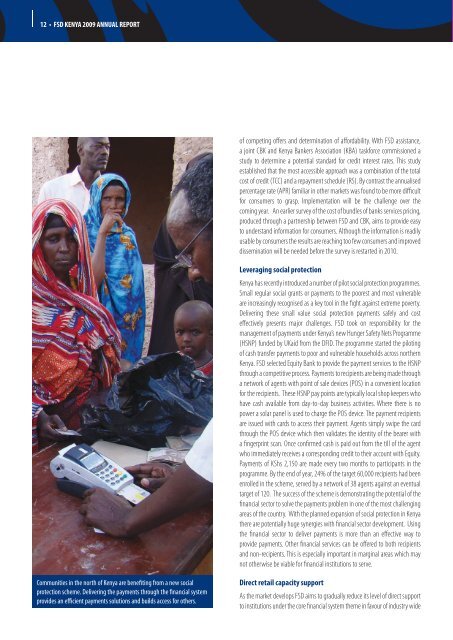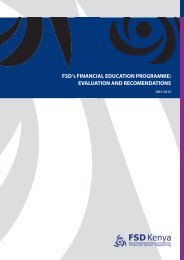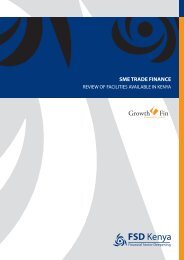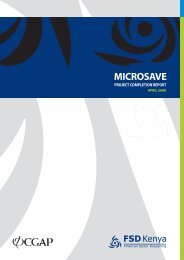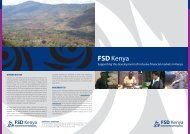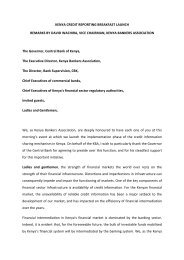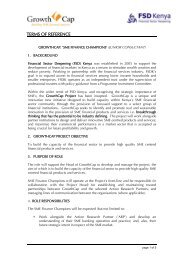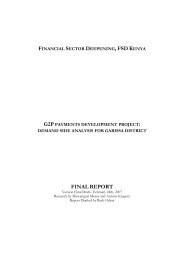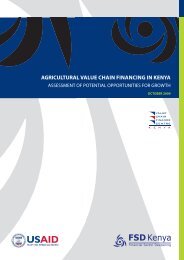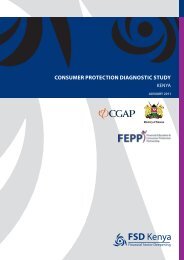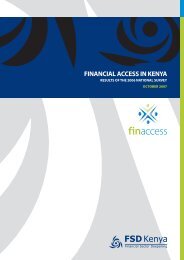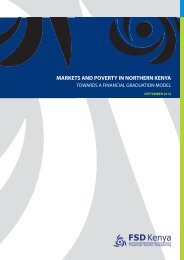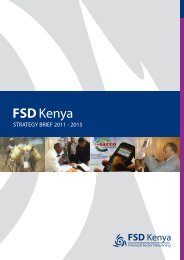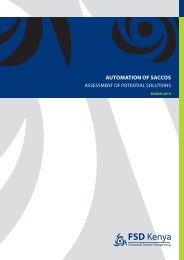2009 - FSD Kenya
2009 - FSD Kenya
2009 - FSD Kenya
You also want an ePaper? Increase the reach of your titles
YUMPU automatically turns print PDFs into web optimized ePapers that Google loves.
12 • <strong>FSD</strong> KENYA <strong>2009</strong> ANNUAL REPORT<br />
Communities in the north of <strong>Kenya</strong> are benefiting from a new social<br />
protection scheme. Delivering the payments through the financial system<br />
provides an efficient payments solutions and builds access for others.<br />
of competing offers and determination of affordability. With <strong>FSD</strong> assistance,<br />
a joint CBK and <strong>Kenya</strong> Bankers Association (KBA) taskforce commissioned a<br />
study to determine a potential standard for credit interest rates. This study<br />
established that the most accessible approach was a combination of the total<br />
cost of credit (TCC) and a repayment schedule (RS). By contrast the annualised<br />
percentage rate (APR) familiar in other markets was found to be more difficult<br />
for consumers to grasp. Implementation will be the challenge over the<br />
coming year. An earlier survey of the cost of bundles of banks services pricing,<br />
produced through a partnership between <strong>FSD</strong> and CBK, aims to provide easy<br />
to understand information for consumers. Although the information is readily<br />
usable by consumers the results are reaching too few consumers and improved<br />
dissemination will be needed before the survey is restarted in 2010.<br />
Leveraging social protection<br />
<strong>Kenya</strong> has recently introduced a number of pilot social protection programmes.<br />
Small regular social grants or payments to the poorest and most vulnerable<br />
are increasingly recognised as a key tool in the fight against extreme poverty.<br />
Delivering these small value social protection payments safely and cost<br />
effectively presents major challenges. <strong>FSD</strong> took on responsibility for the<br />
management of payments under <strong>Kenya</strong>’s new Hunger Safety Nets Programme<br />
(HSNP) funded by UKaid from the DFID. The programme started the piloting<br />
of cash transfer payments to poor and vulnerable households across northern<br />
<strong>Kenya</strong>. <strong>FSD</strong> selected Equity Bank to provide the payment services to the HSNP<br />
through a competitive process. Payments to recipients are being made through<br />
a network of agents with point of sale devices (POS) in a convenient location<br />
for the recipients. These HSNP pay points are typically local shop keepers who<br />
have cash available from day-to-day business activities. Where there is no<br />
power a solar panel is used to charge the POS device. The payment recipients<br />
are issued with cards to access their payment. Agents simply swipe the card<br />
through the POS device which then validates the identity of the bearer with<br />
a fingerprint scan. Once confirmed cash is paid out from the till of the agent<br />
who immediately receives a corresponding credit to their account with Equity.<br />
Payments of KShs 2,150 are made every two months to participants in the<br />
programme. By the end of year, 24% of the target 60,000 recipients had been<br />
enrolled in the scheme, served by a network of 38 agents against an eventual<br />
target of 120. The success of the scheme is demonstrating the potential of the<br />
financial sector to solve the payments problem in one of the most challenging<br />
areas of the country. With the planned expansion of social protection in <strong>Kenya</strong><br />
there are potentially huge synergies with financial sector development. Using<br />
the financial sector to deliver payments is more than an effective way to<br />
provide payments. Other financial services can be offered to both recipients<br />
and non-recipients. This is especially important in marginal areas which may<br />
not otherwise be viable for financial institutions to serve.<br />
Direct retail capacity support<br />
As the market develops <strong>FSD</strong> aims to gradually reduce its level of direct support<br />
to institutions under the core financial system theme in favour of industry wide


